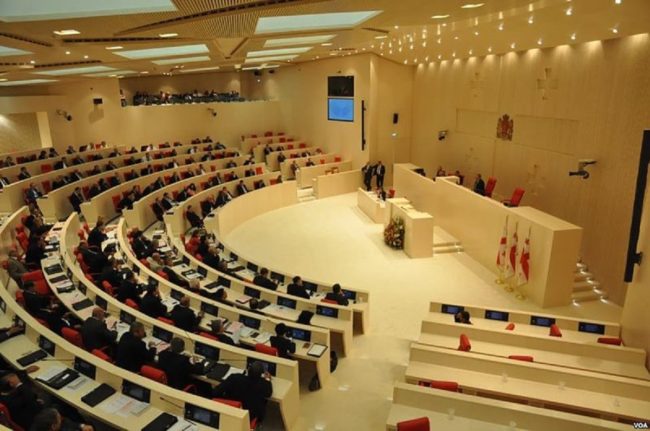

 Georgia’s parliament has adopted a resolution calling for those committing human rights violations in Abkhazia and South Ossetia to be punished. The resolution orders the cabinet to create a list of people accused or convicted of ‘murder, kidnapping, torture and inhumane treatment, and serious damage to the health of Georgian citizens on the occupied territories’. It also calls for sanctions against those covering up such crimes.
Georgia’s parliament has adopted a resolution calling for those committing human rights violations in Abkhazia and South Ossetia to be punished. The resolution orders the cabinet to create a list of people accused or convicted of ‘murder, kidnapping, torture and inhumane treatment, and serious damage to the health of Georgian citizens on the occupied territories’. It also calls for sanctions against those covering up such crimes.
Of 150 MPs, 106 voted in favour of the bill, with none voting against it, and four abstaining; 40 MPs were not present.
The bill was initiated by the opposition European Georgia party, and endorsed by the ruling Georgian Dream. The Alliance of Patriots and the former ruling party, the United National Movement, abstained from taking part in the vote.
The resolution also demands that Russia ‘not to thwart the thorough investigation of Archil Tatunashvili’s death’, and ‘not obstruct the execution of justice against the murderer of Giga Otkhozoria’. It also urged Russia to let the European Union Monitoring Mission enter Abkhazia and South Ossetia and ‘not to hinder the access of international human rights protection mechanisms in Abkhazia and Tskhinvali Region’.
The list, according to the parliament, will be called the Otkhozoria–Tatunashvili List, referring to the cases of Georgian citizens Giga Otkhozoria and Archil Tatunashvili.
Otkhozoria, 32, was murdered in May 2016 at a checkpoint near the village of Khurcha by an Abkhazian border guard. Georgia has called for Rashid Kandzhi-Ogly, convicted in absentia by a Georgian court, to be imprisoned. He was initially placed under house arrest by the Abkhazian authorities, but the charges against him were later dropped. Abkhazia cited Tbilisi’s failure to send evidence, while Georgian authorities said the claim was ‘absurd’, according to Civil.ge.
Tatunashvili, a former Georgian soldier, died on 23 February 2018 in Tskhinvali (Tskhinval), allegedly after being tortured by prison guards. The South Ossetian security services have claimed he died after falling from the stairs while trying to escape. Tatunashvili’s body was handed over to Georgian authorities 26 days after his death.
On 21 March, the Centre for Rehabilitation of Victims of Torture — Empathy, a forensics group involved in examining Tatunashvili’s body, said that the preliminary results showed a number of injuries that ‘indicate a high likelihood of torture’.
The Georgian Parliament has ordered the Cabinet to come up with and approve the Otkhozoria–Tatunashvili List before 15 June. The resolution urges the government to ‘take measures’ to ensure ‘all possible restrictions’ are applied to such individuals by international organisations and allied states, including cancelling visas and preventing financial transactions.
For ease of reading, we choose not to use qualifiers such as ‘de facto’, ‘unrecognised’, or ‘partially recognised’ when discussing institutions or political positions within Abkhazia, Nagorno-Karabakh, and South Ossetia. This does not imply a position on their status.









